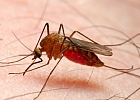University leads way in Malaria research
Published: 24 April 2009
Experts are developing a powerful diagnostic tool in the battle to diagnose and treat Malaria.
Experts have begun developing a powerful diagnostic tool in the battle to diagnose and treat Malaria.
Using Lab-on-a-chip* science, academics at the university aim to produce an electronic chip which will not only tell doctors what species of malaria a patient has, but whether it is resistant to first line drugs.
 It is the only Malaria study of its kind in the UK to use the technology.
It is the only Malaria study of its kind in the UK to use the technology.
Since 2000, an average of 1700 Britons have been diagnosed with the disease every year, although the number of actual cases is thought to be much higher through under reporting.
There are concerns among health professionals that not only are rates of incidence increasing but that drug resistance in Malaria treatment is becoming a severe problem.
Dr Lisa Ranford-Cartwright, a senior lecturer in the Faculty of Biomedical and Life Sciences at the University of Glasgow and project lead, says the new lab-on-a-chip technology will help doctors treat the disease more quickly as well as save lives.
Last week, university researchers tested the Malaria chip with their first human blood sample from the Scottish Parasite Diagnostic Laboratory. The result, which proved positive for P. malariae Malaria, matched the diagnosis of the laboratory.
Dr Ranford-Cartwright said: “We are greatly encouraged by this initial result. Obviously we need to do a full programme of clinical tests, but the fact that this first test was positive is an excellent start.
“Currently, it can take anything up to 48 hours to determine whether a patient has Malaria and even then, doctors are unable to tell whether the parasite is drug resistant. In certain cases, a malaria diagnosis has to be confirmed by DNA amplification which can take another one to two days. The only current way to test for drug resistance is to give patients certain drugs and wait to see if they work.
“Our Malaria chip should be able to do the whole process in less than 60 minutes, and we hope that by the end of our development project we will have reduced this time further.”
Dr Joseph Mugasa, a Tanzanian post-doctoral student who works on the project, added: “Drug resistance complicates treatment and often prolongs a patient's suffering and recovery. It some cases it can be the cause of death. The Malaria chip will be designed to advise clinicians on which drugs to use.”
The news comes on the eve of World Malaria Day (Sat 25 April) which looks to highlight the horror of this disease which kills more than one million people annually. Most prevalent in sub-Saharan Africa and parts of south-east Asia, Malaria claims the life of a child every 30 seconds.
Symptoms include a fever and chronic exhaustion. The most severe form of the disease is cerebral malaria, caused by Plasmodium falciparum, and is fatal largely due to late diagnosis.
Dr Kitty Smith, Medical Lead at the Travel Health Section, Health Protection Scotland, welcomed the development.
She said: “Drug resistance in malaria is becoming increasingly widespread. Plasmodium falciparum, which causes severe malaria, has developed resistance to nearly all of the antimalarial drugs in current use, though the extent of resistance varies from one country to another. Recently, multi-drug resistance has emerged in the Thailand – Cambodia border area, popular with UK travellers.
“Drug resistance can make treatment less effective, putting patients at risk of more severe disease and it limits the choice of drugs to prevent malaria, both for people living in countries where malaria is endemic and for travellers to those countries.”
Notes To Editors:
Lab on a chip technology is based on a silicon chip mounted on a 1”x3” plastic slide that provides the necessary mechanical, thermal, electrical and fluidic connections. For more information click here
For more information please contact Eleanor Cowie, Media Relations Officer at the University of Glasgow on Telephone; 0141 330 3683 or Email: e.cowie@admin.gla.ac.uk
First published: 24 April 2009
<< April

